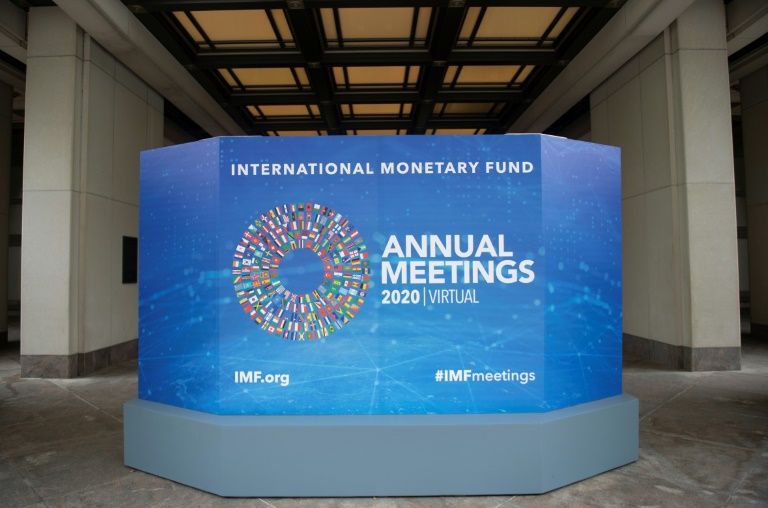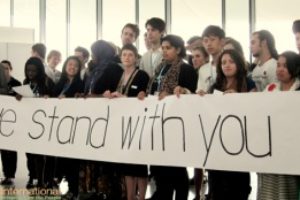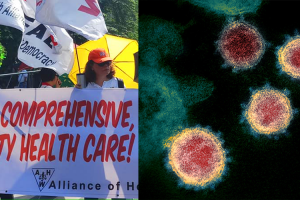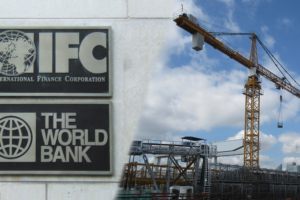Photo credit: uk.finance.yahoo.com
The IMF-World Bank proposals for a post-COVID economic “new normal” gears up for a “recovery” that means more of the old exploitative patterns. They are joining calls for more resilient, inclusive and sustainable recovery, but their agenda would be fuel for a broken engine—more accumulation of capital.
With the closing of the 2020 Annual Meetings of the International Monetary Fund (IMF) and the World Bank on 18 October, IBON International manifests its utmost concern that these institutions continue to neglect structural barriers to development, and instead are driving approaches to debt and “recovery” for the interests of big private sector and creditor capital.
By now, there is a clearer picture that the recession will be worse than previously imagined. Trillions of dollars have been used to “save” financial markets and for bailouts, but millions of people are expected to be thrown into extreme poverty. We believe that these United States-led, neoliberal institutions are promoting paths that are not fit to address people’s needs nor have the ambition to address the deep roots of our crises.
We are concerned that, despite the heavy debt burdens even before the pandemic, the IMF-World Bank refuse to cancel debts burdening the people, with the global South given a mere pause from paying. The premise, however, is an assured return to the old marathon of payments, the business-as-usual of draining resources from the global South.The IMF-World Bank have only supported the limited, short-term suspensions of debt payments at the G20, which does not apply for all developing countries, nor include private and multilateral creditors. The World Bank Group is flatly opposed to extending this limited debt moratorium to themselves, while they continue to receive billions. A recent IMF call for “reforms in the debt infrastructure” boils down to removing obstacles to smooth flows of repayments.
Worse, the global South has seen more debts. IMF loans amid the pandemic in more than 80 countries have been around USD 100 billion—with civil society organisations calling out that IMF has continued built-in austerity targets which restrict countries’ social service spending. Two-thirds of the World Bank’s USD 160-billion assistance promise would be concessional loans, which remain to be debts owed to the World Bank. In the end, elite-led states commonly pass the bill to the people and the future generations, which especially burden women, via regressive taxation.
IMF loans amid the pandemic in more than 80 countries have been around USD 100 billion—with civil society organisations calling out that IMF has continued built-in austerity targets which restrict countries’ social service spending. Two-thirds of the World Bank’s USD 160-billion assistance promise would be concessional loans, which remain to be debts owed to the World Bank. In the end, elite-led states commonly pass the bill to the people and the future generations, which especially burden women, via regressive taxation.
The IMF-World Bank proposals for a post-COVID economic “new normal” gears up for a “recovery” that means more of the old exploitative patterns. They are joining calls for more resilient, inclusive and sustainable recovery, but their agenda would be fuel for a broken engine—more accumulation of capital.The IMF, speaking at the business-led World Economic Forum (WEF), talks of a “need [for] a great reset,” which follows the WEF that explicitly calls for a “great reset for capitalism.” The private sector arm of the World Bank Group, the International Finance Corporation (IFC), has self-servingly insisted that the current private sector-first approach for development is supposedly more relevant than ever.
In the IMF-World Bank rhetoric for “recovery,” there is striking silence on the power of transnational corporations, big banks and finance, amid growing evidence of these as barriers to development. It frames the green agenda as a business opportunity, such as for “green” infrastructure as a market for corporate investment. They push for digitalization, but without addressing the corporate monopoly of technologies, or their use in TNC-led production networks that facilitate labour exploitation in the global South. They cry for more social protection but not as a right, instrumentalising social protection rather to drive labour productivity in contexts of economic “recovery.”
IBON International also highlights that IMF-World Bank narratives risk forgetting their responsibility for the policies that have driven our crises today.For instance, the decades of funding of dirty energy and development aggression, the liberalisation of investments that benefitted mining, against climate justice; the promotion of global value chains that have used technology to speed up production at the lowest wages; the promotion of privatisation of services through conditionalities, Public-Private Partnerships and otherwise, whose effects on healthcare costs meant a death sentence for the poor.
The multiple crises today have unravelled neoliberal policy assumptions. IBON International asserts that instead of the business-as-usual, far greater ambition is necessary in international shifts in economic policy and development. Pandemic responses and the agenda for a post-pandemic economy must be built on the fulfilment of people’s rights, especially of working women who have carried the brunt of the crises. The challenge is to strengthen healthcare and other social services as rights,deliver on ambitious grant finance and development commitments,cancel Southern debt to all creditors even in the long-term, and have progressive taxation on TNCs and capital. These are urgent for development, instead of more debt and mere debt suspensions, conditionalities, regressive taxes on the people, and corporate-driven approaches.
It is crucial for people’s organizations, movements and CSOs in the global South to raise our voices and reclaim our rights, futures and development. From the Cordillera Indigenous Peoples in the Philippines during the 1980s to the campaign to save the Bisri Valley in Lebanon in 2020, people’s actions have shown victories to defend people’s rights vis-à-vis these international finance institutions (IFIs).
In the end, it is crucial for people’s organizations, movements and CSOs in the global South to raise our voices and reclaim our rights, futures and development. From the Cordillera Indigenous Peoples in the Philippines during the 1980s to the campaign to save the Bisri Valley in Lebanon in 2020, people’s actions have shown victories to defend people’s rights vis-à-vis these international finance institutions (IFIs). Asserting the people’s right to determine development paths is crucial, with the stakes of the people’s future too big to be left to the IFIs, corporations, and elite-led states. ###



